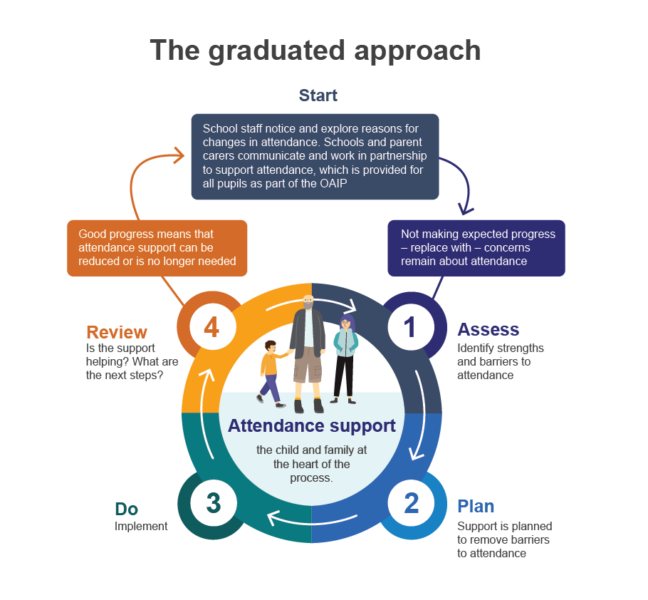For a small number of children who are unable to attend school, schools can put in place more specialist individualised support with help from other agencies. Ordinarily available and targeted support should form part of this individualised approach.
It’s important to speak with your child’s school to find out what support is available to you and your child.
Whilst your child may be attending very infrequently or may have stopped attending at all, it is important that there is still an active plan to support their education. This can include a stepped support plan written with your child and their school.
Stepped support plan
A stepped support plan can be used to help your child to return to school by focusing on small achievable steps. This is also known as a reintegration plan. The stepped support plan can outline ways to reconnect your child with school and their friends by breaking things down into small steps.
This might include:
- doing some school work at home
- having phone or email contact with a member of staff
- meeting friends in the community
- putting on school uniform and going for a walk
- walking past the school with someone they trust
- coming into school for a short time
- meeting a friend in school
- going into the student support centre or similar
- attending a preferred lesson
If there are other professionals working with your child, they can contribute to the stepped support plan so that everyone is working together. Your views and your child’s views should be central to the plan.
The stepped support plan will outline the support that the school can put in place for your child to help them to come back to school.
This might include:
- sending work home
- regular contact with a trusted adult from school
- reduced timetable
- accessing learning in the student support centre
- talking about their worries with a trusted adult
- regular meetings to review the support plan with your child, school, and other professionals
What else might help?
Support from Inclusion Services
If your child has medical or health needs and hasn’t been attending school regularly, your SENCO or other professional may suggest speaking to the local authority for support. This is sometimes called a ‘Section 19’ referral. According to Section 19 of the Education Act 1996, local authorities must arrange suitable education for children who can’t attend school due to illness, exclusion, or other reasons. In Devon, this may include alternative education support. It’s advisable to discuss it with your child’s school in the first instance.
Education, health and care (EHC) plans
For a very small number of children and young people who have special educational needs (SEN) it may be necessary for them to have an education, health and care (EHC) plan. An EHC plan may be suitable if your child needs more support than is available through the ordinarily available inclusive provision (OAIP) and targeted support.
An EHC plan is a legal document that sets out a child or young person’s education, health and care needs and the additional support required. You may request an education, health and care (EHC) needs assessment if you think your child needs an EHC plan.

